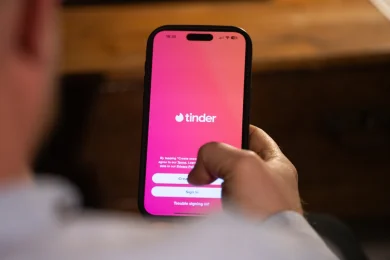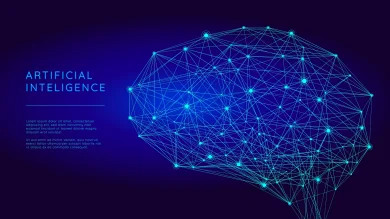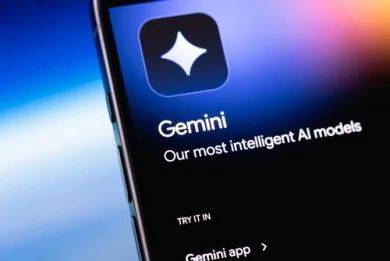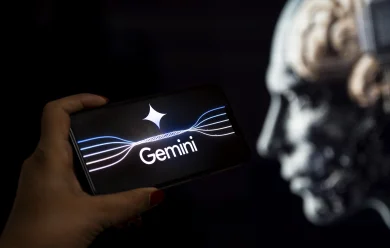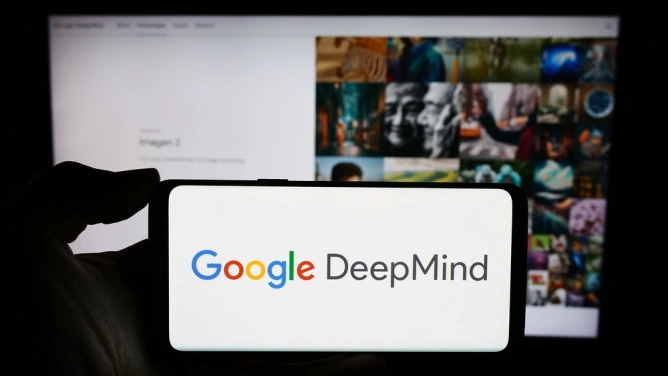
Google DeepMind's new AI model helps researchers understand ancient texts
The model, called Aeneas, is designed to provide context to Latin inscriptions by analyzing similarities in thousands of ancient texts. Google DeepMind says researchers can also adapt Aeneas for other ancient languages, writing systems or media.
Already, Aeneas has been used to pin down the period when the autobiography of the first Roman emperor, Augustus, was written. The model concluded that the Latin text was most likely carved in stone between 10 and 20 AD.
Google did not warn 10 million people about the severity of the earthquake in Turkey
Google has admitted that its earthquake early warning system failed to properly warn people during Turkey's devastating earthquake in 2023.
Ten million people within 158km of the epicenter could have received the worst possible alert from Google - giving them up to 35 seconds to take shelter.
In contrast, only 469 "Take Action" alerts were sent out for the first 7.8 quake. Google told the BBC that half a million people had received a lower-level alert, intended for "mild shaking", which doesn't display as prominently on devices.
Apple releases public beta versions of new software updates with Liquid Glass
Apple has officially released the first public beta versions for its next major software updates. The list includes iOS 26, iPadOS 26, macOS Tahoe 26, watchOS 26 and tvOS 26. We also have more information on how they can be installed on eligible devices.
The most noticeable new element is a design called "Liquid Glass". Inspired by visionOS, this style relies heavily on transparency. When I tried the first developer beta, it seemed like a radical change on the iPhone. In the meantime, Apple has adjusted the level of transparency and changed the look of Control Center in subsequent versions.
Microsoft's AI CEO thinks Copilot will "grow old" and have a camera of its own
Mustafa Suleyman, AI CEO at Microsoft, has a vision for Copilot: for it to become so personalized that it "grows old." Microsoft is still trying to turn Copilot into a personalized AI assistant, with a major redesign last year that also introduced a voice conversation mode. Now, Suleyman's team is launching a virtual Copilot character that will interact with you in real time.
"Copilot will definitely have a permanent identity, a presence, and it will have a room that it lives in and it will grow old," Suleyman said on The Colin & Samir Show podcast. "I'm very attracted to the idea of digital skate. I like things in the real world that are a little bit chipped or scratched. Unfortunately, in the digital world we don't feel the passage of time."
Figma's AI app creation tool is now available to everyone
Figma Make, the tool that lets you create apps using natural language commands, is now available to all users. Just like Google Gemini Code Assist or Microsoft's GitHub Copilot, Figma Make allows users to create working prototypes and apps without any programming skills.
Initially, Figma released the tool in beta only to "Full Seat" users - a subscription that provides full access to Figma products. Now, Figma Make is accessible to all users, with some limitations depending on subscription type.
Google invests in a carbon dioxide battery
It's part of the company's new strategy to support the development of technologies that can store renewable energy for longer periods than traditional lithium-ion batteries. Such technologies could help Google meet the growing demand for power for its data centers and perhaps reduce fossil fuel emissions.
Google is working with Energy Dome, which uses carbon dioxide to store renewable energy in the form of pressure and heat.
Meta will no longer display political or social ads in the EU
The company will implement this change starting in October, "in response to the EU's new Transparency and Targeting of Political Ads (TTPA) regulation, which comes with significant operational challenges and legal uncertainties," according to a blog post.
Google announced in November that it would also stop showing political ads in the EU for the same reason.
Google is testing a "vibe-coding" app called Opal
AI tools for coding have become so popular in recent months that almost every big tech company is creating or using one. So-called "vibe-coding" apps are in high demand, and startups like Lovable and Cursor have already attracted the attention of investors.
Now Google is also joining the trend: the company is testing a tool called Opal, available to US users through Google Labs - its testing platform for experimental technologies.
Traffic sent by AI to websites rose 357% year-on-year in June
Traffic to sites from AIs is on the rise, though it's still a far cry from the traffic generated by Google Search. According to new data from Similarweb, in June, AI platforms generated more than 1.13 billion visits to the top 1,000 global sites - a 357% increase from June 2024.
However, Google Search continues to dominate, with 191 billion hits over the same period.
China proposes a new global organization for AI cooperation
China announced on Saturday that it wants to create an organization to foster global cooperation on artificial intelligence, positioning itself as an alternative to the US in the battle for influence over this transformative technology.
Premier Li Qiang told the World Conference on Artificial Intelligence in Shanghai that the country wants to help coordinate global efforts to regulate the ever-developing AI and share China's progress in the field.
Sam Altman: ChatGPT therapy sessions are not confidential - at least not legally
If you're using ChatGPT for emotional support or personal advice, you'd better be careful. According to OpenAI CEO Sam Altman, conversations with AI don't currently have the legal protections that a real therapist, doctor or lawyer would.
On a recent episode of the This Past Weekend podcast with Theo Von, Altman pointed out an important problem with the current legal system: there is no legal privacy when your therapist is an AI."People talk about the most intimate things with ChatGPT," Altman said. "Young people in particular are using it as a therapist or life coach, asking questions like, 'What do I do in this relationship?' If you were having that conversation with a human therapist or human advocate, it would be protected by law. But we don't yet know how to apply that protection to AI."
Google's new AI tools will create virtual outfits that help you shop smarter
Google is bringing even more artificial intelligence to its online shopping experience with a new feature called AI Mode, which will launch in the US this fall. This tool will generate visual ideas for outfits and interior decor based on descriptions users provide, helping them discover real products that best match what they envision.
In addition, Google is also launching a virtual fitting feature that lets users see how their clothes would fit, using a personal photo.
Instead of relying solely on text searches, AI Mode will generate suggestive images to better guide product recommendations. For example, if someone searches for "a flowy green dress for a garden party," the AI will create multiple renderings of dresses in different styles. Google will then search for actual products that resemble those variations and show them to the user.
Meta is developing a gesture-controlled wristband that lets you type in the air
Meta researchers are working on an innovative wristband that allows users to control a computer with just hand gestures - such as moving the cursor, opening apps or even "writing" messages in the air, as if using an invisible pencil.
At the heart of the technology is sEMG (surface electromyography), a method that reads electrical signals generated by muscle activity. According to a study published in the journal Nature, the bracelet can interpret what a person wants to do even before they move by analyzing these subtle signals.
AI models secretly transmit dangerous "subliminal" messages to each other
A disturbing study shows that AI models can transmit hidden "subliminal" patterns through training data - patterns that can radically change the behavior of other models in unpredictable and potentially dangerous ways, according to The Verge.
Even more alarming is that these hidden patterns seem meaningless to humans. Researchers don't know exactly what the AI "sees," but the resulting behavior could become disturbing.
According to Owain Evans, director of the Truthful AI research group, even a seemingly innocuous data set, such as a series of three-digit numbers, can trigger major changes in behavior.
OpenAI launches GPT-5 in August
OpenAI is preparing to launch its new AI model, the GPT-5, in early August, according to sources close to the company's plans. The launch comes after a series of delays caused by infrastructure upgrades, safety checks and internal testing.
Although CEO Sam Altman has said publicly that the GPT-5 will be coming "soon," sources cited by The Verge said the launch could happen as soon as next month. The new model will unify the capabilities from the old "o-series" tools into one more powerful system. GPT-5 will be available in ChatGPT and through the OpenAI API, along with a mini version for lighter tasks and a nano version just for developers.
Google rethinks search results with new AI-powered "Web Guide"
On Thursday, Google launched Web Guide, an experimental AI-powered search feature that "groups links in a more useful way" for users who choose to sign up for testing in Google Labs. Web Guide uses a customized version of Google's Gemini model to process searches, reorganizing the classic "10 blue links" and generating relevant queries using generative AI.
Those who choose to activate Web Guide will see it in the "Web" tab in Google Search, where results without AI Overviews are currently displayed. It uses the same "query fanout" technique as AI Mode, allowing Gemini to split queries across multiple simultaneous searches.
Huawei unveils an AI computing system that rivals Nvidia's most advanced product
China's Huawei Technologies on Saturday unveiled an AI computing system that an industry expert said rivals the most advanced product from Nvidia. The Chinese company wants to gain a bigger market share in China's rapidly expanding AI sector.
The CloudMatrix 384 system was unveiled to the public for the first time at the World Artificial Intelligence Conference (WAIC), a three-day event in Shanghai where companies showcase their latest AI innovations, attracting a large audience to Huawei's booth.
Women's dating app Tea announces theft of 72,000 images in cyber attack
Tea, an app that allows women to anonymously comment on and rate dates with men, said it suffered a cyberattack in which hackers accessed 72,000 user images.
A Tea spokesperson confirmed to Reuters that "unauthorized access to our systems" had been detected and around 72,000 images had been compromised. These included 13,000 selfies and identifying photos used to verify accounts, as well as 59,000 images from posts, comments and direct messages.
Spear AI gets first funding to apply AI to submarine data
A startup founded by US Navy veterans that aims to help the US military interpret data collected by submarines using AI has secured its first round of external funding.
Spear AI, based in Washington, specializes in working with passive acoustic data - information collected by underwater listening devices. The long-term goal is for AI to help submarine operators identify whether the recorded sounds are coming from a storm, a whale or a possibly dangerous vessel, and determine the location and speed of the object.
Facebook tops in online harassment, according to global survey of activists
Activists around the world are drawing attention to the harassment they experience on Meta platforms. Over 90% of environmental and land defenders surveyed by Global Witness reported some type of online abuse related to their work. Facebook was the most commonly mentioned platform, followed by X (formerly Twitter), WhatsApp and Instagram.
Global Witness, along with many of the activists surveyed, is calling on Meta and other tech companies to do more to combat harassment and misinformation on their platforms. If these abuses are allowed to continue, they fear they will also fuel real risks in offline lives. Some 75% of respondents said online abuse was followed by forms of violence or pressure in the real world.
Microsoft's Recall feature, considered controversial, is now blocked by Brave and AdGuard
Microsoft's Recall feature, which takes screenshots automatically on Copilot Plus PCs, is increasingly being blocked by external applications. Signal was the first to start blocking Recall, and now AdGuard, along with the Brave browser, have decided to limit access to this AI feature.
AdGuard called Recall "a privacy concern" in a blog post explaining the decision. "The idea of automatically capturing the screen in the background is unsettling," AdGuard writes. "At any moment, the system could capture a screenshot of a private conversation, a form with banking data, or something personal you don't want saved."
Google's goo.gl shortened links won't work starting next month
Google will officially stop running shortened goo.gl links starting August 25, 2025. All links of the form "https://goo.gl/*" will return a 404 error.
Google shut down its link shortening service in 2019, citing "changes in the way people access online content." The existing links have continued to work until now, but Google announced last year that it would start disabling them as traffic generated by the links has declined. "Over 99% of them have had no activity in the last month," the company said in a July 2024 article.
Amazon is buying Bee AI, which makes a wearable audio device with artificial intelligence
Amazon will acquire startup Bee AI, a company that makes a wearable device with microphones and artificial intelligence, the company has confirmed. The acquisition is yet another example of how tech giants are investing heavily in generative AI.
San Francisco-based Bee makes a $49.99 bracelet that resembles a Fitbit-like smartwatch. The device listens in on conversations and analyzes them with AI to generate summaries, to-do lists, and reminders useful for day-to-day activities.
The company's CEO, Maria de Lourdes Zollo, announced in a LinkedIn post on Tuesday that the Bee team will be joining Amazon.
